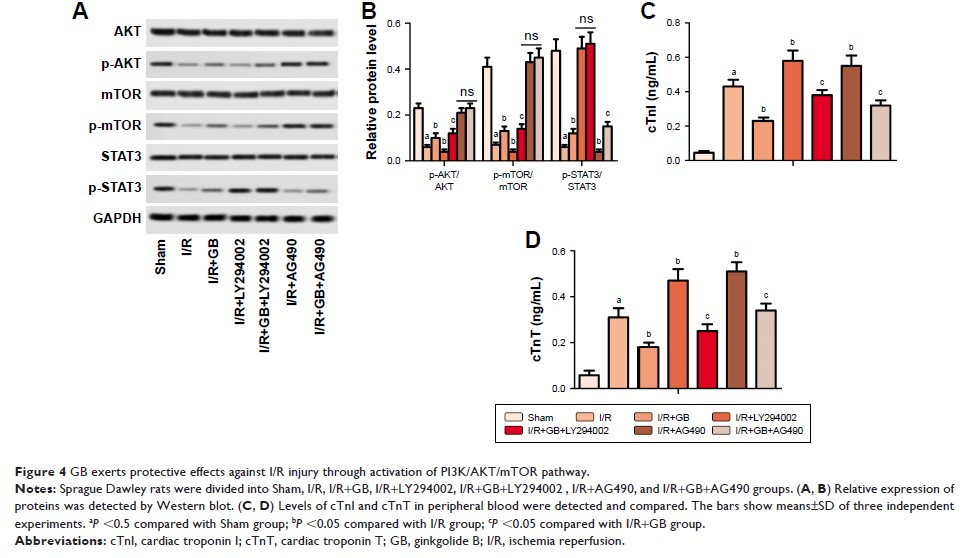108605
论文已发表
注册即可获取德孚的最新动态
IF 收录期刊
- 3.4 Breast Cancer (Dove Med Press)
- 3.2 Clin Epidemiol
- 2.6 Cancer Manag Res
- 2.9 Infect Drug Resist
- 3.7 Clin Interv Aging
- 5.1 Drug Des Dev Ther
- 3.1 Int J Chronic Obstr
- 6.6 Int J Nanomed
- 2.6 Int J Women's Health
- 2.9 Neuropsych Dis Treat
- 2.8 OncoTargets Ther
- 2.0 Patient Prefer Adher
- 2.2 Ther Clin Risk Manag
- 2.5 J Pain Res
- 3.0 Diabet Metab Synd Ob
- 3.2 Psychol Res Behav Ma
- 3.4 Nat Sci Sleep
- 1.8 Pharmgenomics Pers Med
- 2.0 Risk Manag Healthc Policy
- 4.1 J Inflamm Res
- 2.0 Int J Gen Med
- 3.4 J Hepatocell Carcinoma
- 3.0 J Asthma Allergy
- 2.2 Clin Cosmet Investig Dermatol
- 2.4 J Multidiscip Healthc

银杏内酯 B 通过抑制内质网应激改善大鼠心肌缺血再灌注损伤
Authors Guo C, Zhang J, Zhang P, Si A, Zhang Z, Zhao L, Lv F, Zhao G
Received 17 July 2018
Accepted for publication 15 January 2019
Published 26 February 2019 Volume 2019:13 Pages 767—774
DOI https://doi.org/10.2147/DDDT.S179101
Checked for plagiarism Yes
Review by Single-blind
Peer reviewers approved by Dr Cristina Weinberg
Peer reviewer comments 4
Editor who approved publication: Professor Jianbo Sun
Purpose: Ginkgolide
B (GB) is a terpene lactone component found in Ginkgo biloba ,
which has a protective role on ischemia reperfusion (I/R) injury. This study
was aimed at exploring the protective mechanism of GB on the myocardial I/R.
Patients and methods: Myocardial
I/R model was established on Sprague Dawley rats. The levels of cardiac
troponin I, cardiac troponin T, lactic dehydrogenase, and myoglobin were
determined by a 200FR NEO automatic biochemical analyzer. Histological
examination was performed through HE and terminal deoxynucleotidyl
transferase-mediated dUTP nick end-labeling staining. The expression levels of
p-PERK, p-IRE1α, ATF6, p-AKT, and mTOR were detected by Western blot.
Results: The
results exhibited that GB treatment suppressed the high levels of cardiac
troponin I, cardiac troponin T, lactic dehydrogenase, and myoglobin and
ameliorated the damaged and irregularly arranged myocardial cells induced by
I/R injury significantly, indicating that GB could ameliorate myocardial I/R
injury. Moreover, the high expression levels of endoplasmic reticulum (ER)
stress key proteins caused by I/R injury were suppressed significantly by GB
treatment, including p-PERK, p-IRE1α, and ATF6. GB treatment also decreased the
number of apoptotic cells compared with I/R group. In addition, activation of
ER stress by Tunicamycin treatment could counteract the protective effects of
GB on I/R injury, suggesting that GB ameliorated myocardial I/R injury through
inhibition of ER stress-induced apoptosis. Finally, the decreased p-AKT and
p-mTOR expressions caused by I/R injury were upregulated by GB and inhibition
of PI3K/AKT/mTOR pathway by LY294002 abolished the protective effects of GB on
I/R injury, indicating that GB activated PI3K/AKT/mTOR pathway during I/R
injury.
Conclusion: GB
protected against myocardial I/R injury through inhibiting ER stress-induced
apoptosis via PI3K/AKT/mTOR signaling pathway.
Keywords: myocardial
injury, Ginkgolide B, endoplasmic reticulum stress, apoptosis PI3K/AKT/mTOR
pathway
